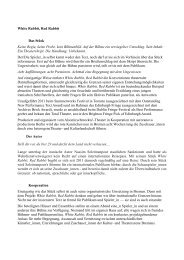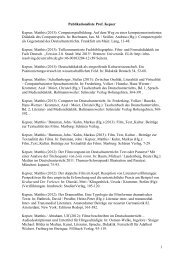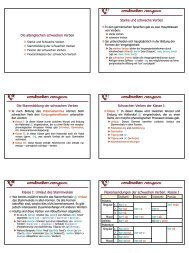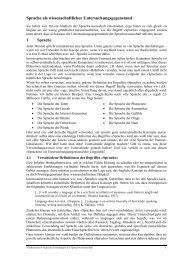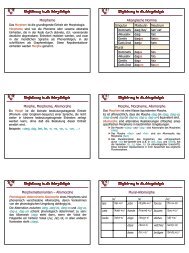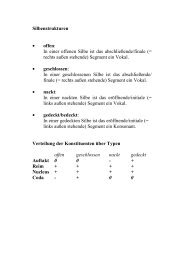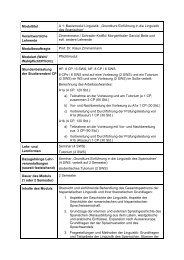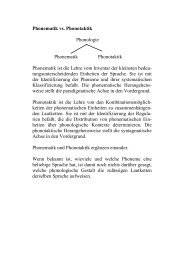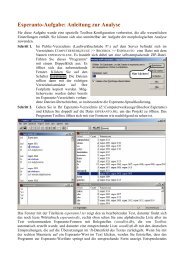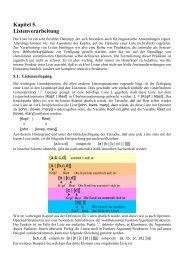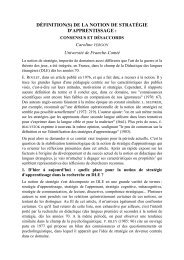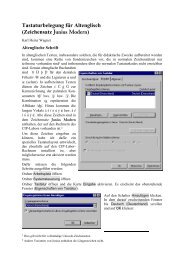Relativism and Universalism in Linguistics - Fachbereich 10 ...
Relativism and Universalism in Linguistics - Fachbereich 10 ...
Relativism and Universalism in Linguistics - Fachbereich 10 ...
Create successful ePaper yourself
Turn your PDF publications into a flip-book with our unique Google optimized e-Paper software.
Section A: Language Contact 13<br />
(8) Inork ez daki (Basque)<br />
nobody.ERG NEG knows<br />
‘Nobody knows it’<br />
The analysis: This paper accounts for the syntactic distribution of N-words <strong>in</strong> preverbal <strong>and</strong><br />
postverbal positions <strong>in</strong> Basque Spanish. Furthermore, it discrim<strong>in</strong>ates between what is<br />
transferred from Basque, if anyth<strong>in</strong>g, <strong>and</strong> what is kept as part of the syntax of Romance<br />
languages. These two goals are accomplished by: (i) determ<strong>in</strong><strong>in</strong>g the syntactic properties of<br />
Basque Spanish N-words, (ii) compar<strong>in</strong>g them with the syntactic properties of negative<br />
elements <strong>in</strong> Basque <strong>and</strong> St<strong>and</strong>ard Spanish. Thus, whereas Basque Spanish N-words abide by<br />
the syntax of St<strong>and</strong>ard Spanish (i.e. negative XPs are not NPIs), some similarities with<br />
Basque, such as seem<strong>in</strong>gly parallel word orders <strong>and</strong> absence of anti-agreement effects <strong>in</strong>duced<br />
speakers of this variety to <strong>in</strong>terpret the doubl<strong>in</strong>g NEG head as an agreement marker <strong>and</strong><br />
develop a negative concord relation with the preverbal N-word.<br />
The universal component of Gender Agreement <strong>in</strong> Code-<br />
Switch<strong>in</strong>g<br />
González-Vilbazo, Kay E. / Rothe, Astrid<br />
University of Ill<strong>in</strong>ois at Chicago UIC / Universität zu Köln<br />
kay.gonzalez@uni-koeln.de;astrid.rothe@uni-koeln.de<br />
Our talk deals with gender agreement <strong>in</strong> DPs which conta<strong>in</strong> a code-switch between the noun<br />
<strong>and</strong> its determ<strong>in</strong>er. In monol<strong>in</strong>gual contexts, the gender of the noun <strong>and</strong> the determ<strong>in</strong>er have<br />
to agree, as <strong>in</strong> the Spanish examples <strong>in</strong> (1) <strong>and</strong> (2), i.e. they have to bear the same abstract<br />
gender feature.<br />
(1) el tenedor<br />
the-MASC. fork-MASC.<br />
(2) *la tenedor<br />
the-FEM. fork-MASC.<br />
In our data from code-switch<strong>in</strong>g pairs like Spanish/German or French/German (Gonzalez<br />
1996, Gonzalez/Müller 2003 <strong>and</strong> Rothe 2004/2005), we found gender agreement patterns that<br />
differ strik<strong>in</strong>gly from known monol<strong>in</strong>gual patterns. Example (3) shows a mixed DP <strong>in</strong> which<br />
the noun <strong>and</strong> its determ<strong>in</strong>er bear different genders <strong>and</strong> yet the example is grammatical. In (4),<br />
we can observe that chang<strong>in</strong>g the gender renders the DP ungrammatical.<br />
(3) el Brötchen<br />
the-MASC. bun-NEUT.<br />
(4) *la Brötchen<br />
the-FEM. bun-NEUT.<br />
Even more unexpected is the fact shown <strong>in</strong> (5), where a DP conta<strong>in</strong><strong>in</strong>g a noun <strong>and</strong> a<br />
determ<strong>in</strong>er with the same gender turns out to be ungrammatical.<br />
(5) *der cuaderno<br />
ART-MASC. notebook-MASC.<br />
These agreement patterns can be expla<strong>in</strong>ed without postulat<strong>in</strong>g a specific grammar for codeswitch<strong>in</strong>g.<br />
All that is required are the monol<strong>in</strong>gual grammars of the <strong>in</strong>volved languages <strong>and</strong> a<br />
general theory about agreement. This is captured <strong>in</strong> the agreement constra<strong>in</strong>t (Gonzalez 2005)



